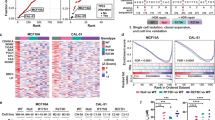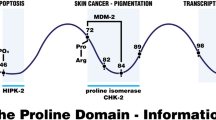Abstract
THE cyclin-dependent kinase inhibitor p16 is a candidate tumour-suppressor protein that maps to a genomic locus strongly associated with familial melanoma and other tumour types 1–3. Screening of primary tumours and linkage analysis of familial melanoma pedigrees have identified many potential mutations in p16, but the functional significance of these sequence variants has remained unclear1,3–9. We report here that pi6 can act as a potent and specific inhibitor of progression through the Gl phase of the cell cycle, and we demonstrate that several tumour-derived alleles of p16 encode functionally compromised proteins. The ability of p16 to arrest cell-cycle progression generally correlates with inhibition of cyclin Dl/Cdk4 kinase activity in vitro, with two exceptions among the alleles tested. In vivo, the presence of functional retino-blastoma protein appears to be necessary but may not be sufficient to confer full sensitivity to p!6-mediated growth arrest. Our results provide support for the notion that pi6 is an important cell-cycle regulator whose inactivation contributes to the outgrowth of human tumours.
This is a preview of subscription content, access via your institution
Access options
Subscribe to this journal
Receive 51 print issues and online access
$199.00 per year
only $3.90 per issue
Buy this article
- Purchase on Springer Link
- Instant access to full article PDF
Prices may be subject to local taxes which are calculated during checkout
Similar content being viewed by others
References
Kamb, A. et al. Science 264, 436–440 (1994).
Fountain, J. W. et al. Proc. natn. Acad. Sci. U.S.A. 89, 10557–10561 (1992).
Mori, T. et al. Canc. Res. 54, 3396–3397 (1994).
Spruck, C. H. et al. Nature 370, 183–184 (1994).
Caldas, C. et al. Nature Genet. 8, 27–32 (1994).
Hussussian, C. J. et al. Nature Genet. 8, 15–21 (1994).
Kamb, A. et al. Nature Genet. 8, 22–26 (1994).
Cairns, P. et al. Science 265, 415–416 (1994).
Wainwright, B. Nature Genet. 8, 3–5 (1994).
Serrano, M., Hannon, G. J. & Beach, D. Nature 366, 704–707 (1993).
van den Heuvel, S. & Harlow, E. Science 262, 2050–2054 (1993).
Deuschle, U., Hipskind, R. A. & Bujard, H. Science 248, 480–483 (1990).
Hannon, G. J. & Beach, D. Nature 371, 257–261 (1994).
Zhang, H., Hannon, G. J. & Beach, D. Genes Dev. 8, 1750–1758 (1994).
Zhang, H., Xiong, Y. & Beach, D. Molec. Biol. Cell 4, 897–906 (1993).
Ewen, M. E. et al. Cell 73, 487–497 (1993).
Kato, J.-Y., Matsushime, H., Hiebert, S. W., Ewen, M. E. & Sherr, C. J. Genes Dev. 7, 331–342 (1993).
Meyerson, M. & Harlow, E. Molec. cell. Biol. 14, 2077–2086 (1994).
Sherr, C. J. Cell 79, 551–556 (1994).
Otterson, G. A., Kratzke, R. A., Coxon, A., Kim, Y. W. & Kaye, F. J. Oncogene 9, 3375–3378 (1994).
Jacks, T. et al. Nature 359, 295–300 (1992).
Serrano, M., Gomez-Lahoz, E., DePinho, R. A., Beach, D. & Bar-Sagi, D. Science 267, 249–252 (1995).
Guan, K.-L. et al. Genes Dev. 8, 2939–2952 (1994).
Baker, S. J., Markowitz, S., Fearon, E. R., Willson, J. K. V. & Vogelstein, B. Science 249, 912–915 (1990).
Zhu, L. et al. EMBO J. 14, 1904–1913 (1995).
Dynlacht, B. D., Flores, O., Lees, J. A. & Harlow, E. Genes Dev. 8, 1772–1786 (1994).
Zhu, L. et al. Genes Dev. 7, 1111–1125 (1993).
Author information
Authors and Affiliations
Rights and permissions
About this article
Cite this article
Koh, J., Enders, G., David Dynlacht, B. et al. Tumour-derived p16 alleles encoding proteins defective in cell-cycle inhibition. Nature 375, 506–510 (1995). https://doi.org/10.1038/375506a0
Received:
Accepted:
Issue Date:
DOI: https://doi.org/10.1038/375506a0
This article is cited by
-
N-terminal acetylation can stabilize proteins independent of their ubiquitination
Scientific Reports (2023)
-
Decreased number of p16-positive senescent cells in human endometrium as a marker of miscarriage
Journal of Assisted Reproduction and Genetics (2021)
-
Evolution of late-stage metastatic melanoma is dominated by aneuploidy and whole genome doubling
Nature Communications (2021)
-
Polyclonal BRCA2 mutations following carboplatin treatment confer resistance to the PARP inhibitor rucaparib in a patient with mCRPC: a case report
BMC Cancer (2020)
-
Precision medicine in Ewing sarcoma: a translational point of view
Clinical and Translational Oncology (2020)
Comments
By submitting a comment you agree to abide by our Terms and Community Guidelines. If you find something abusive or that does not comply with our terms or guidelines please flag it as inappropriate.



